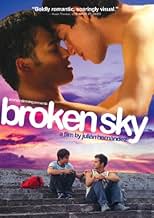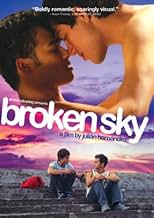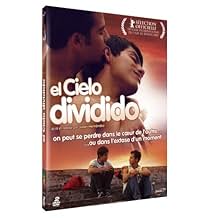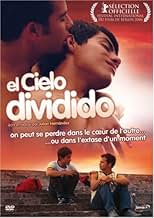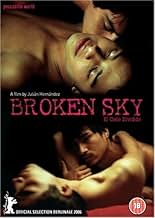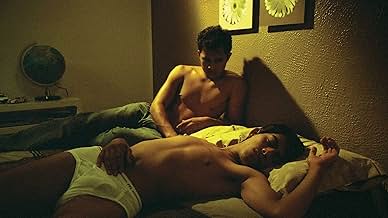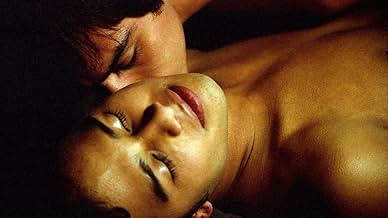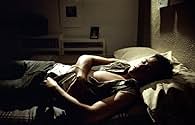IMDb RATING
5.7/10
1.3K
YOUR RATING
Two students, Gerardo and Jonas, are in love. However, Jonas becomes obsessed with another boy, which leads to Gerardo moving into arms of Sergio.Two students, Gerardo and Jonas, are in love. However, Jonas becomes obsessed with another boy, which leads to Gerardo moving into arms of Sergio.Two students, Gerardo and Jonas, are in love. However, Jonas becomes obsessed with another boy, which leads to Gerardo moving into arms of Sergio.
- Awards
- 2 wins total
Clarisa Rendón
- María
- (as Clarissa Rendón)
- Director
- Writer
- All cast & crew
- Production, box office & more at IMDbPro
Featured reviews
The film is a bit tedious. It's mostly a silent film, with the bulk o the story provided through a series of voice-overs. While making a silent film like this is not such a bad idea, this is one of those films where the lack of dialog and the repetitive early scenes make it simply tedious. You don't understand the reason for the tedium until well into the picture, and by then it's too late. The first 40 minutes of film is something of a slow piece of Mexican soft porn, and unimaginative soft porn at that. Later in the film the style of the first 40 minutes starts to makes sense, but it's too late, because by then the audience is lost. There is some nice location shooting at the National Autonomous University of Mexico. I've often wondered why more films aren't shot there. The campus is built on the edge of lava fields that lend the campus a very otherworldly feel. My biggest problem with the film is that the director/writer has made the film the way he wanted to see it without regard for how a viewer who doesn't know the story will view it. You can't ignore the audience when you tell a story.
Like João Pedro Rodrigues (Two Drifters), Mexican filmmaker Julián Hernández makes obsessively gay films unlike Almodóvar, whose outlook may be gay but who has achieved almost universal acceptance through his varied milieus, intricately amusing plots and use of women in prominent roles (not to mention his general brilliance as a filmmaker, which neither Rodrigues nor Hernández has yet established). Hernández's sphere is even more narrow than Rodrigues', but more emotionally accessible and less odd. Influences include Cocteau, Pasolini, Wong Kar Wai and the Duras/Resnais collaboration of' Hiroshima mon amour, a line from which is quoted as an epigraph. Unlike Rodrigues', this filmmaker's few characters are not oddballs or obsessives but simply prettier-than-average middle-class Mexico City young men oppressed by love-longing. Like Hernández's previous feature A Thousand Clouds of Peace (2003) in its preoccupations but with higher production values, the subject is a young man whose love object eludes him. Two female characters are barely more than glimpsed in passing. We're examining a gay love affair and nothing else. These are students, but don't ask what their majors are. They spend more time in discos than in classrooms.
As in the previous Hernández feature, plot and dialogue are minimized. There are voiceovers but the characters rarely speak. We get used to their miming their feelings. Gerardo (Miguel Angel Hoppe) picks up Jonas (Fernando Arroyo) in a playing field at the university and the passionate kisses and embraces and the sex begin right away. Then Jonas starts averting his face when Gerardo tries to caress or kiss him. And yet they're still regularly sleeping together. Gradually a third person enters the picture Sergio (Alejandro Rojo), a slightly older man, a tall, dark, brooding fellow, even easier on the eyes than the other two. He has already watched the pair play hide and seek in the library stacks when he was installing a light bulb. Sergio has wanted Gerardo for a long time, or so he says when they finally get together after one of several encounters in a gay-friendly club in this film, everywhere is gay friendly. Scenes take place either around the university, in the guy's rooms, or in a club; all problems other than love are minimized or eliminated. Except for some yellow filters, the photography is pretty, but straightforward. None of Wong Kar Wai's richly grungy pads here: the rooms are conventional middle-class housing, with tasteful prints on the walls and textbooks on the shelves, not palatial but posh for students' digs. The guys only have a few pairs of jeans, but they sure have lots of shirts.
The message that the film conveys and though it is too long, it's basic idea works; the scenes convey the desired feelings and the editing is seamless at first is that two people never seem to love each other at the same time to the same degree in the same way.
But the ending is a happy and romantic one. Once Sergio and Gerardo are a couple, Jonas begins to long for Gerardo again, and in the final scene, they've gotten back together.
Broken Sky is more like a poem or an opera or most of all, a dance than a conventional film. It's a different experience. The mainstream audience would never put up with all this gay sex without dialogue or plot. Not every gay man will have the patience to watch these amorous comings and goings for the full 140 minutes, either. I'm not sure that the poetic voiceovers were necessary; and a third of them are lost to non Spanish-speakers because the white-on-white subtitles are illegible. They are a bit too poetic and general. The boys are too specific to be so generalized by the language. Needless to say, "the real world" is beyond the range of Broken Sky. But there's no denying that Broken Sky in its own way is unique and beautiful. The director achieves what he was clumsily groping for in his first one. He is using cinematic language in a way that it rarely is any more he achieves the instinctive identification and emotional directness of the silent film. Broken Sky makes you think about the unspoken element in any relationship, the things that can never be communicated in words: in short, the world of eroticism and feelings. Hernández contributes to the effectiveness of his visual poem through excellent use of various musical accompaniments, a few notes on a clavicord, a string quartet above all, a sweet pop love song the lyrics of each lovingly translated in subtitles. It's as if Gerardo and Jonas were trying to live a pop song. And I guess that's what moony young gay guys do a lot of the time. There's even a coloratura operatic aria; considering the operatic tone of things, the filmmakers exercise great forbearance in using only one. Maybe this is "a new cinematic language," as was said of Antonioni's L'Avventura. For a while one can savor it, admire the naive sweetness of it. But can anyone read it? And can it say more than one thing?
As in the previous Hernández feature, plot and dialogue are minimized. There are voiceovers but the characters rarely speak. We get used to their miming their feelings. Gerardo (Miguel Angel Hoppe) picks up Jonas (Fernando Arroyo) in a playing field at the university and the passionate kisses and embraces and the sex begin right away. Then Jonas starts averting his face when Gerardo tries to caress or kiss him. And yet they're still regularly sleeping together. Gradually a third person enters the picture Sergio (Alejandro Rojo), a slightly older man, a tall, dark, brooding fellow, even easier on the eyes than the other two. He has already watched the pair play hide and seek in the library stacks when he was installing a light bulb. Sergio has wanted Gerardo for a long time, or so he says when they finally get together after one of several encounters in a gay-friendly club in this film, everywhere is gay friendly. Scenes take place either around the university, in the guy's rooms, or in a club; all problems other than love are minimized or eliminated. Except for some yellow filters, the photography is pretty, but straightforward. None of Wong Kar Wai's richly grungy pads here: the rooms are conventional middle-class housing, with tasteful prints on the walls and textbooks on the shelves, not palatial but posh for students' digs. The guys only have a few pairs of jeans, but they sure have lots of shirts.
The message that the film conveys and though it is too long, it's basic idea works; the scenes convey the desired feelings and the editing is seamless at first is that two people never seem to love each other at the same time to the same degree in the same way.
But the ending is a happy and romantic one. Once Sergio and Gerardo are a couple, Jonas begins to long for Gerardo again, and in the final scene, they've gotten back together.
Broken Sky is more like a poem or an opera or most of all, a dance than a conventional film. It's a different experience. The mainstream audience would never put up with all this gay sex without dialogue or plot. Not every gay man will have the patience to watch these amorous comings and goings for the full 140 minutes, either. I'm not sure that the poetic voiceovers were necessary; and a third of them are lost to non Spanish-speakers because the white-on-white subtitles are illegible. They are a bit too poetic and general. The boys are too specific to be so generalized by the language. Needless to say, "the real world" is beyond the range of Broken Sky. But there's no denying that Broken Sky in its own way is unique and beautiful. The director achieves what he was clumsily groping for in his first one. He is using cinematic language in a way that it rarely is any more he achieves the instinctive identification and emotional directness of the silent film. Broken Sky makes you think about the unspoken element in any relationship, the things that can never be communicated in words: in short, the world of eroticism and feelings. Hernández contributes to the effectiveness of his visual poem through excellent use of various musical accompaniments, a few notes on a clavicord, a string quartet above all, a sweet pop love song the lyrics of each lovingly translated in subtitles. It's as if Gerardo and Jonas were trying to live a pop song. And I guess that's what moony young gay guys do a lot of the time. There's even a coloratura operatic aria; considering the operatic tone of things, the filmmakers exercise great forbearance in using only one. Maybe this is "a new cinematic language," as was said of Antonioni's L'Avventura. For a while one can savor it, admire the naive sweetness of it. But can anyone read it? And can it say more than one thing?
"Broken Sky" is an art film with great performances, visually entertaining (stills/photography shots during credits are superbly done!), and plot treatment not usually seen in any gay films. Some people may find scenes excruciatingly long, but I've enjoyed every moment of it and the journey the director wants to convey in this movie. You must know that you need this arduous shots to feel the emotions of the characters in the movie. The sex scenes are tastefully done, not vulgar, and the gratuitous frontal nudity is significant (in one scene, main actor examines his body/self on the mirror). I've always admired Latin cinema movie-making as mostly they always get the right texture and lighting for their 35 mm. movie. In totality, it's one of the best films I've seen during L.A. OUTFEST 2006 (next to movies: "A Love to Hide," "Boy Culture" and "The Blossoming of Maximo Oliveros"). -- Oliver Carnay
'El Cielo dividido' (BROKEN SKY) is a daring, experimental film from Mexican writer/director Julián Hernández and as such it is bound to polarize audiences. Some will fault the film for self-indulgence while others will praise the bravery of a film of this topic to come from a country not exactly known for its flexible social attitudes.
Julián Hernández focuses on the history of a first love and without using dialogue he tells his story simply with silent actors, minimal narrative comments which serve as program notes, music, and ravishingly beautiful photographic composition. Gerardo (Miguel Ángel Hoppe) opens the film, a solo youth wandering what appears to be the streets of Mexico City finally ending up in an open amphitheater where his eye glimpses another lone youth Jonas (Fernando Arroyo) sitting staring into space. Gerardo wanders over to him, sits beside him, gains the courage to touch his shoulder, Jonas responds glowingly - and love begins. Through the next scenes we find the couple making love both in bed and in unexpected public places including the stacks of the library of the school where they both are students -and where another pair of eyes enters: Sergio (Alejandro Rojo) watches longingly as Gerardo and Jonas kiss and display an aura of passion Sergio obviously longs for.
The new couple share many experiences, all bathed in love, until they eventually go to a disco: Jonas dances with an enchanted Bruno (Ignacio Pereda) and a trace of chemistry is generated, a fact that Gerardo, watching the boys dance, senses and is disturbed. A crack is created in their bliss and that crack only widens as they each have mixed responses to what they perceive is escaping. Gerardo encounters the winsome Sergio and the two bond physically, a fact that forces Jason to reevaluate his initial feelings for Gerardo.
All of this story is told without dialogue of words but with a very strong dialogue of eyes. Director Hernández seems to want to share how love is an internalized emotion, only demonstrated with physical intimacy, but fragile as a newborn in its vulnerability to wounds. Cinematographer Alejandro Cantú finds stunning settings and lighting and sensitive explorations of love making that never exceed tasteful states. His manner of showing time elapsing is to pan walls within a room that serve as flashbacks and flash-forwards as a means of carrying the story forward. Film editor Emiliano Arenales Osorio uses some very creative techniques to keep the viewer guessing as to whether we are observing fact, fantasy, present or past. And the musical score by Arturo Villela deftly maintains the minimalist stance with simple phrases by cello, harpsichord, and violin, saving the passion expression for the use of Dvorák in Rusalka's 'Song to the Moon' as ravishingly sung by Renée Fleming All of those praises being said, the major reason this film doesn't retain an audience base is its length: it is 140 minutes long, repetitive, and would have been much more powerful had it been cut to 90 minutes at best. It is far too visually stunning a piece of work to step beyond the patience of an audience happy to see the birth and blossoming and challenges of a first love between two beautiful young men. The actors are indeed a pleasure to watch, but in this case less is more. One wonders what Julián Hernández will create next. He deserves applause for this experimental film but hopefully will learn from its tendency toward self-indulgence. Grady Harp
Julián Hernández focuses on the history of a first love and without using dialogue he tells his story simply with silent actors, minimal narrative comments which serve as program notes, music, and ravishingly beautiful photographic composition. Gerardo (Miguel Ángel Hoppe) opens the film, a solo youth wandering what appears to be the streets of Mexico City finally ending up in an open amphitheater where his eye glimpses another lone youth Jonas (Fernando Arroyo) sitting staring into space. Gerardo wanders over to him, sits beside him, gains the courage to touch his shoulder, Jonas responds glowingly - and love begins. Through the next scenes we find the couple making love both in bed and in unexpected public places including the stacks of the library of the school where they both are students -and where another pair of eyes enters: Sergio (Alejandro Rojo) watches longingly as Gerardo and Jonas kiss and display an aura of passion Sergio obviously longs for.
The new couple share many experiences, all bathed in love, until they eventually go to a disco: Jonas dances with an enchanted Bruno (Ignacio Pereda) and a trace of chemistry is generated, a fact that Gerardo, watching the boys dance, senses and is disturbed. A crack is created in their bliss and that crack only widens as they each have mixed responses to what they perceive is escaping. Gerardo encounters the winsome Sergio and the two bond physically, a fact that forces Jason to reevaluate his initial feelings for Gerardo.
All of this story is told without dialogue of words but with a very strong dialogue of eyes. Director Hernández seems to want to share how love is an internalized emotion, only demonstrated with physical intimacy, but fragile as a newborn in its vulnerability to wounds. Cinematographer Alejandro Cantú finds stunning settings and lighting and sensitive explorations of love making that never exceed tasteful states. His manner of showing time elapsing is to pan walls within a room that serve as flashbacks and flash-forwards as a means of carrying the story forward. Film editor Emiliano Arenales Osorio uses some very creative techniques to keep the viewer guessing as to whether we are observing fact, fantasy, present or past. And the musical score by Arturo Villela deftly maintains the minimalist stance with simple phrases by cello, harpsichord, and violin, saving the passion expression for the use of Dvorák in Rusalka's 'Song to the Moon' as ravishingly sung by Renée Fleming All of those praises being said, the major reason this film doesn't retain an audience base is its length: it is 140 minutes long, repetitive, and would have been much more powerful had it been cut to 90 minutes at best. It is far too visually stunning a piece of work to step beyond the patience of an audience happy to see the birth and blossoming and challenges of a first love between two beautiful young men. The actors are indeed a pleasure to watch, but in this case less is more. One wonders what Julián Hernández will create next. He deserves applause for this experimental film but hopefully will learn from its tendency toward self-indulgence. Grady Harp
This could have been the gay counterpart to Gone With The Wind given its epic lenght, but instead it satisfied itself by being a huge chain of empty episodes in which absolutely nothing occurs. The characters are uni-dimensional and have no other development in the story (there's actually no story either) than looking for each other and kissing. It's a shame that an interesting aesthetic proposition like having almost no dialog is completely wasted in a film than makes no effort in examining the psychology of its characters with some dignity, and achieving true emotional resonance. On top of that, it pretends to be an "art" film by using the worst naive clichés of the cinematic snobbery. But anyway, if someone can identify with its heavy banality, I guess that's fine.
Did you know
- ConnectionsReferenced in Les Griffin: Road to Rupert (2007)
- SoundtracksEn mi cielo
Written and performed by Volovan
By Arrangement with Universal Music Mexico
Details
Box office
- Gross US & Canada
- $29,185
- Opening weekend US & Canada
- $4,956
- Oct 1, 2006
- Gross worldwide
- $160,445
- Runtime
- 2h 20m(140 min)
- Color
- Sound mix
- Aspect ratio
- 1.85 : 1
Contribute to this page
Suggest an edit or add missing content

